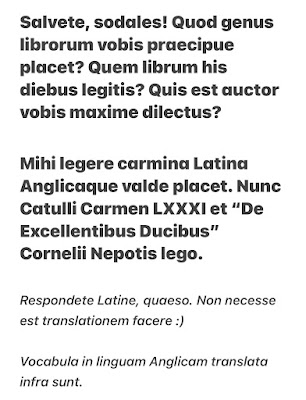Referring to:
https://www.youtube.com/watch?v=P8qNo3Kkro4
https://www.facebook.com/.../permalink/528987953045811/
Terlinguae
3:41: Hoc oppidulum Terlingua nōminātur
3:45: Hic locus aptissimus est peregrīnīs │
[i] aptus, -a, -um: suitable > aptissimus, -a, -um: very / most suitable
[ii] peregrīnus, -ī [2/m]: (here) hiker > Hic locus aptissimus est peregrīnīs [dative]:
this place is very suitable for hikers [or: most suited to hikers]
3:48: quod prope montēs situs est
3:50: Post ascēnsiōnem, fessī sumus et ēsurīmus
3:58: Pernoctābimus hīc
4:01: Bonum māne
4:02: Terlinguae adsumus│ [see note]*
4:05: Tandem dormīvī bene
4:09: Hodiē domum redīmus
4:37: Plūrimās grātiās agō
4:39: Sī tibi placuit pellicula,
4:42: Subscrībe canālī, amābō tē
4:45: In proximum!
[A] Give the video timings when Vincent refers to:
1. Feeling hungry
2. Being near the mountains
3. Going back home
4. Having slept well
5. Liking the film
6. Where they will spend the night
[B] Find the Latin:
1. finally
2. if you liked (the film)
3. is called
4. please
5. See you next time!
6. today
____________________
*Note:
4:02: Terlinguae adsumus │ We are in Terlingua
Vincent is using the locative case;
Terlingua is the name of a town and, in Latin, when you are in a
specific named town / city, the preposition in +
ablative is not used:
In oppidulō sum │I am in a
little town (but the town isn’t named)
Oppidulum Terlingua vocātur │ The little town is called
Terlingua
Terlinguae adsumus │We are in Terlingua
(no preposition)
A post was published some time back on this topic:
https://www.facebook.com/.../permalink/415064654438142/
The locative case is not an additional case
that has to be studied in depth; its use is confined to the names of towns,
cities and small islands, and to a handful of other nouns
1st declension nouns:
- Rōma > Rōmae │ in Rome (no preposition)
2nd declension nouns:
- Brundisium > Brundisiī │ in Brundisium
3rd declension nouns:
- Carthāgō > Carthāgine / Carthāginī │ in Carthage
Some Latin town names are plural:
1st declension
- Athēnae > Athēnīs: in Athens
2nd declension
- Pompeiī > Pompeiīs: in Pompeii
The nouns you will come across which have a locative case
are:
- domus (house) > domī: at home
- rūs (countryside) > rūrī: in the countryside
- humus (ground) > humī: on the ground
The Latin Tutorial video on the locative case is here:
https://www.youtube.com/watch?v=VwLS-fh3pVg
However, unusually for these videos (because I regularly use
them), the presenter tends to ramble a little at the beginning – and he goes on
to other points that are not specifically related to what is being discussed
here, and so I’ve uploaded an edited version.













